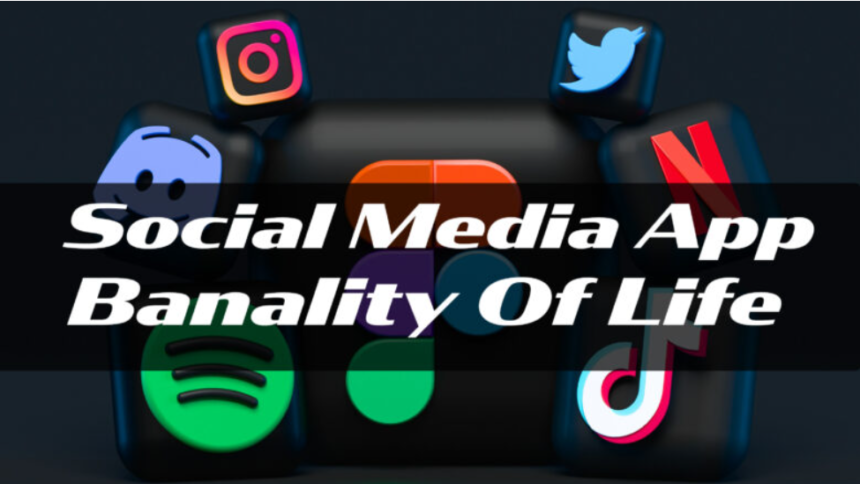Introduction to Social media app banality of life
Welcome to the digital age, where social media app banality of life have become an integral part of our daily lives. From scrolling through Instagram for fashion inspiration to checking Twitter for breaking news, these platforms have revolutionized how we connect and consume information. However, beneath the glossy filters and curated feeds lies a darker side that often goes unnoticed – the banality of life caused by excessive social media use. Let’s delve into the impact of these apps on our mental well-being and explore ways to navigate this digital landscape mindfully.
The negative impact of social media on mental health
Scrolling endlessly through social media feeds has become a habitual pastime for many, often leading to feelings of inadequacy and comparison. The curated highlight reels of others can breed discontentment in our own lives, fostering a sense of unworthiness. Constant exposure to idealized images and lifestyles can distort one’s perception of reality, creating an unrealistic standard to measure oneself against.
The pressure to maintain a flawless online image can be overwhelming, fueling anxiety and self-doubt. Seeking validation through likes and comments may provide temporary gratification but can ultimately contribute to feelings of insecurity and dependency on external affirmation. The constant need for approval from virtual strangers can erode genuine self-esteem and confidence over time.
Moreover, the fear of missing out (FOMO) induced by social media updates can exacerbate feelings of loneliness and isolation if not managed effectively. Setting boundaries around social media usage is crucial in safeguarding mental well-being amidst the digital noise that perpetuates comparison culture.
Addiction to social media and its consequences
Social media addiction is a real issue that many people face in today’s digital age. The constant need to check notifications, scroll endlessly through feeds, and seek validation from likes and comments can lead to a detrimental impact on mental health.
Individuals may find themselves spending hours mindlessly browsing social media, neglecting real-life relationships, responsibilities, and hobbies. This addiction can result in increased feelings of anxiety, low self-esteem, and even depression.
Moreover, the curated content displayed on social media platforms often portrays an unrealistic version of reality. Users may compare their own lives unfavorably to the seemingly perfect images shared by others online, leading to feelings of inadequacy or FOMO (fear of missing out).
In extreme cases, social media addiction can interfere with sleep patterns, productivity levels at work or school, and overall well-being. It is essential for individuals to recognize these negative consequences and take steps towards establishing a healthier relationship with social media.
How social media apps have changed our perception of reality
Social media app banality of life have reshaped how we view reality. The carefully curated posts and filters create an idealized version of life that can be misleading. People often compare their own lives to the highlight reels they see online, leading to feelings of inadequacy or FOMO (fear of missing out).
The constant exposure to picture-perfect images can distort our perception of what is real and attainable. We may start believing that everyone else has a flawless life, which can impact our self-esteem and mental well-being.
Moreover, social media encourages us to seek validation through likes and comments, reinforcing the need for external approval. This constant craving for affirmation can blur the lines between genuine experiences and seeking validation from others.
As a result, it’s essential to remember that what we see on social media is often a curated version of reality. It’s crucial to differentiate between someone’s online persona and their true selves in order to maintain a healthy perspective on life.
The role of influencers and the pressure to portray a perfect life on social media
In today’s digital age, influencers play a significant role in shaping trends and influencing millions of followers on social media platforms. With carefully curated posts showcasing an idealized version of their lives, influencers often create an illusion of perfection that can be both inspiring and misleading to their audiences.
The pressure to maintain this facade of flawless living can take a toll on not only the influencers themselves but also on those who aspire to emulate them. The constant comparison to unattainable standards set by these online personalities can lead to feelings of inadequacy and low self-esteem among users.
It’s essential for both influencers and followers alike to remember that what is portrayed on social media is just a highlight reel, not the full picture. Behind the filters and perfectly staged photos lie real people facing challenges and imperfections just like everyone else.
By promoting authenticity over perfection, influencers have the power to shift societal norms towards acceptance of individuality and genuine connections rather than unrealistic ideals. It’s crucial for all parties involved in the social media sphere to prioritize mental well-being over superficial appearances.
Steps to reduce the banality of life caused by social media apps
In a world where social media app banality of life dominate our daily routines, it’s crucial to take steps to mitigate the banality they can bring into our lives. One effective approach is setting boundaries by allocating specific times for social media use and sticking to them religiously. By consciously limiting screen time, you can regain control over your focus and attention.
Another helpful strategy is diversifying your offline activities and hobbies. Engaging in pursuits that don’t involve screens can inject creativity and fulfillment back into your life. Whether it’s picking up a new sport, joining a book club, or volunteering in your community – exploring different avenues outside of social media can offer a refreshing perspective.
Moreover, practicing mindfulness techniques such as meditation or yoga can help center yourself amidst the noise of virtual existence. By grounding yourself in the present moment, you cultivate awareness and reduce the mindless scrolling that often leads to feelings of emptiness.
By implementing these proactive measures, you can reclaim agency over how you engage with social media platforms while fostering a more balanced approach to technology usage in your everyday life.
Conclusion: Finding a balance and using social media responsibly
Finding a balance and using social media responsibly is crucial in today’s digital age. While social media app banality of life have become an integral part of our daily lives, it’s essential to be mindful of the impact they can have on our mental well-being. By being aware of the negative effects such as addiction, altered perception of reality, and pressure from influencers to portray perfection, we can take steps to mitigate these issues.
Setting boundaries for social media usage, practicing self-care offline, engaging in real-life interactions, and cultivating hobbies that don’t involve screens are all effective ways to reduce the banality that social media app banality of life can bring into our lives. Remember that what is showcased on social media is often only a curated highlight reel rather than an accurate depiction of someone’s entire life.
By finding a healthy balance between online and offline activities and using social media mindfully rather than compulsively, we can reclaim control over how we engage with these platforms. It’s up to us to navigate the digital landscape responsibly and prioritize our mental health above all else.







